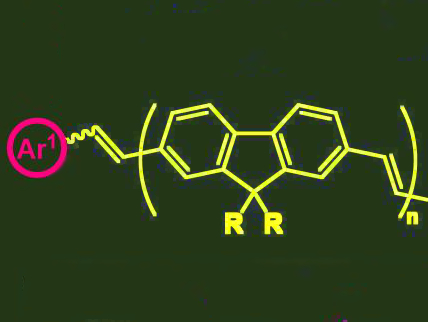Conjugated polymers are promising components for organic electronics. Their optical and/or electronic properties are strongly influenced by the end groups as well as by structural regularity (so-called defect-free nature) and chemical purity. However, there is a lack of methods for the precise synthesis of defect-free conjugated polymers containing different end groups.
Kotohiro Nomura, Tokyo Metropolitan University, Japan, and colleagues have demonstrated the precise synthesis of poly(arylene vinylene)s with different end groups. The researchers used acyclic diene metathesis (ADMET) polymerization with a molybdenum catalyst followed by Wittig-type coupling with an aldehyde. They obtained end-functionalized poly(9,9’-di-n-octyl-fluorene vinylene)s (EF-PFVs) containing a vinyl chain end that is useful for further modification.
The emission properties of the resultant EF-PFVs were influenced by both the end groups and the conjugation repeat units. The method provides a synthesis of a new type of conjugated materials that should be useful for the design of polymers with new optical properties.
- Synthesis of Poly(arylene vinylene)s with Different End Groups by Combining Acyclic Diene Metathesis Polymerization with Wittig-type Couplings,
Tomonari Miyashita, Mikiko Kunisawa, Shunsuke Sueki, Kotohiro Nomura,
Angew. Chem. Int. Ed. 2017, 56, 5288–5293.
DOI: 10.1002/anie.201700466


![Synthesis of [c2]Daisy Chains via Mechanochemistry](https://www.chemistryviews.org/wp-content/uploads/2025/04/202504_RotaxanesWithSolidStateMechanochemistry-125x94.png)

